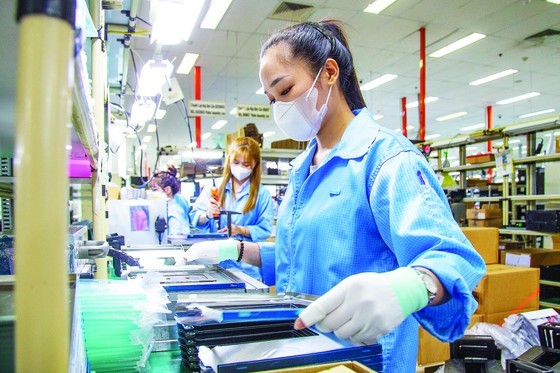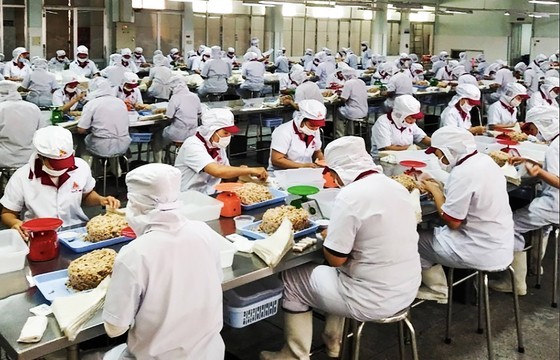 |
Electronic equipment production at Data Logic factory in the Saigon High-Tech Park. (Photo: SGGP) |
The total import and export turnover in the first three months of 2023 was recorded at US$150 billion, significantly lower than the set target of over $200 billion. This has raised concerns among authorities and businesses, who are now rushing to take proactive measures to overcome this challenge.
Promotion of Vietnamese exports
Towards the end of March, the Minister of Industry and Trade, Nguyen Hong Dien, conducted a trade promotion meeting with Vietnam's overseas trade office system. During the meeting, he directed trade counselors, particularly those in key export markets, to provide support to businesses in connecting with potential trade partners and finding new orders.
In response to the above directive, Mr. Do Ngoc Hung, the Trade Counselor of Vietnam in the US, has taken action by contacting and holding discussions with various US stakeholders, such as the US Department of Commerce, US Trade Representative Office, US Customs and Border Protection, lawyers, and importers.
This is intended to assist localities and Vietnamese enterprises in exploring the US market. The trade office has also provided reports and advice to leaders of the Vietnamese Embassy in the US, urging them to meet with relevant US agencies to support businesses. Furthermore, the trade office has closely monitored US policies and regulations to stay updated on any changes or issues that require attention.
According to Mr. Nong Duc Lai, the Vietnam Trade Counselor in Beijing, despite a general decrease in export activities since the beginning of the year, certain traditional commodity groups have witnessed an increase. For instance, vegetables and fruits have seen a rise of 5.2 percent, while pangasius and basa fillets have increased by 16 percent.
The growth can be attributed to the recent opening of the Chinese market to several high-value products from Vietnam, such as durian, edible bird's nest, and sweet potato. China Customs has also recently approved 230 more codes for growing areas and packing facilities of Vietnam's durian, bringing the total number of licensed establishments to 343. This development is expected to boost Vietnam's fruit and vegetable exports to the Chinese market significantly.
Despite the increase in exports, Vietnam's market share of fruit and vegetable exports to China remains modest, accounting for only about 9 percent of China's total annual import turnover of vegetables and fruits. This indicates that there is still a lot of untapped potential in the Chinese market, which Vietnamese businesses can capitalize on.
Mr. Nguyen Canh Cuong, the Trade Counselor of Vietnam in the UK, has stated that the UK market has been unstable in the past two years, resulting in occasional disruptions in the supply chain due to various factors. Nevertheless, Vietnamese businesses can capitalize on the incentives provided by the Vietnam-UK Free Trade Agreement (UKVFTA) to increase exports of agricultural products, seafood, food, textiles, footwear, leather, electronic equipment, furniture, and more to the UK.
Currently, the trade office is building a network to connect British businesses with Vietnamese businesses in the UK to introduce partners and opportunities. Additionally, the trade office provides Vietnamese enterprises with updated information on quality standards and import regulations into the UK.
The unit collaborates with the Trade Promotion Agency and the Department of European-American Markets to organize online seminars and consult Vietnamese export enterprises to connect with British experts and traders in fields, such as agriculture, textiles, and furniture. Furthermore, the trade office supports businesses to participate in exhibitions, thereby promoting Vietnam's goods and export potential.
Supporting, sharing orders
Apart from the support provided by Vietnamese Trade Offices abroad to open up the export market, domestic enterprises are also taking measures to cope with the situation. Mr. Nguyen Ngoc Hoa, Chairman of the HCMC Union of Business Associations, has reported that domestic enterprises are actively connecting with each other to share orders.
Moreover, businesses are increasing the diversity of raw materials, particularly in the textiles and wood processing industry, to effectively address trade remedies from foreign markets. Focusing on the domestic market is also a new direction for many companies.
According to Mr. Pham Xuan Hong, Chairman of the HCMC Association of Garment, Textile, Embroidery, and Knitting, domestic orders can be a lifeline for businesses. Although the number of orders is not significant, it is sufficient for firms to maintain production and overcome the current difficult economic period.
 |
Production at Vissan Company. (Photo: SGGP) |
Mr. Nguyen Anh Duc, the General Director of the HCMC Union of Trade Cooperatives, stated that numerous companies, which have mainly focused on exports in the past, are now approaching their unit to explore the possibilities of expanding their market share in the domestic market.
This shift towards the domestic market is considered a promising direction, given that the size of the Vietnamese market has risen to become the 15th largest in the world. This move not only provides a solution for businesses to overcome the current period but also serves as a sustainable development strategy for the long term.
In HCMC, various departments and agencies are actively engaged in supporting businesses. During the report meeting for the first quarter of 2023, the Department of Industry and Trade of HCMC announced that it would promptly address difficulties and problems faced by businesses, creating favorable conditions for them to operate smoothly and unleash their full potential. The focus would be on products with untapped production potential that can make up for shortfalls in other industrial products. For key industries, the city would prioritize support for the development of competitive products to enable their integration into the global supply chain.
Ho Chi Minh City is actively promoting e-commerce and modern retail models while investing in and upgrading infrastructure facilities, such as traditional markets and retail stores. The city is also implementing programs to stimulate domestic consumption and encouraging businesses to collaborate with domestic e-commerce platforms to increase sales in the domestic market.
To support businesses further, HCMC will continue to work with the State Bank of Vietnam - HCMC Branch to implement the Bank-Business Connection Program, which will increase the ability to disburse loans for businesses. The city will also focus on connecting goods supply and demand, developing distribution channels for domestically produced goods, and creating trading floors for goods (piloting with pork) and large-scale distribution supply chains involving large distribution enterprises, logistics enterprises, farms, and domestic production enterprises. Additionally, the city will support enterprises in promoting export activities by applying cross-border e-commerce methods, encouraging the development of modern and smart shopping forms.
























